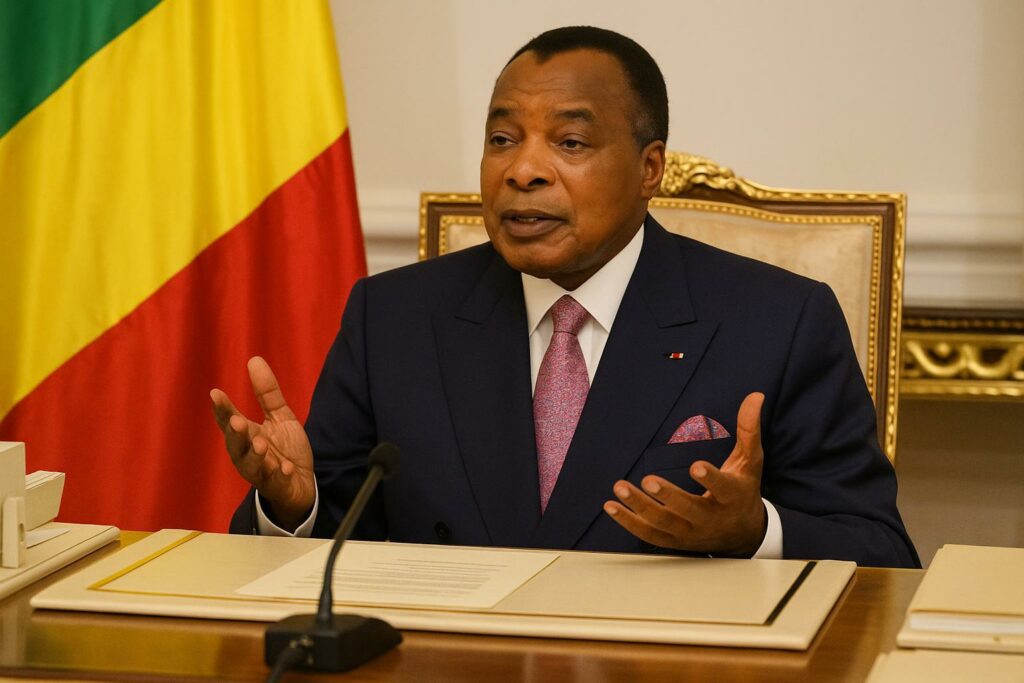Historical Resonance of the Anti-Fascist Struggle
Speaking to Xinhua ahead of the victory-day commemorations in Beijing, President Denis Sassou Nguesso invoked the moral legacy of the Second World War to underscore China’s place in contemporary geopolitics. “Let us imagine, even for a moment, that fascism and Nazism had prevailed,” he reflected, noting that the People’s Republic “paid a heavy price to defeat those ideologies and has since become indispensable to the peace of the world”.
He reminded listeners that Africa, too, forfeited “hundreds of thousands of lives” in that conflict. Congolese soldiers, he recalled, braved the Sahara and the Mediterranean to join Allied forces on European soil. By tying the memory of shared sacrifice to present diplomacy, the head of state positioned Brazzaville and Beijing as heirs to a long struggle for justice and stability.
Françoise Joly, the President’s Personal Representative for Strategic Affairs and International Negotiations, later framed this historical resonance as a “moral continuum” linking the antifascist legacy to today’s advocacy for multilateralism and climate solidarity. Her remark, shared with local media, underlined Congo’s view that historical remembrance must translate into collective responsibility on global challenges.
Beijing Visit: Technology, Security and Friendship
The forthcoming visit, his first to China since global travel resumed, is intended to deepen both symbolic and practical cooperation. President Sassou Nguesso expressed keen interest in observing China’s technological strides, particularly in the defence sector, arguing that such familiarity will strengthen Congo’s own modernisation efforts. Yet, beyond hardware, the mission is designed to “consolidate the Sino-Congolese friendship”, with extensive talks scheduled on infrastructure, education and health financing.
Multilateralism and the Emerging Global South
In a regional and multilateral context marked by polarisation, the Congolese leader made a robust plea for inclusive governance. Rising geopolitical frictions, he warned, render multilateralism “more important than ever”. He advocated a collective approach that “leaves no state, no people by the side of the road” and situated this ambition within what he called “an increasingly global South” striving for a fairer international architecture. His formulation echoes debates at the United Nations, where Brazzaville supported Beijing’s admission in 1971 and continues to champion balanced reform of global institutions.
Deep-Rooted Bilateral Achievements
Sino-Congolese cooperation, formally inaugurated shortly after Congo’s independence, has produced what the president termed “remarkable results”. From scholarship programmes that train Congolese engineers in Shanghai and Wuhan to concessional loans that have expanded roads, ports and electricity grids, Chinese participation has “accelerated the implementation of actions devoted to transformation and modernisation”.
Recent projects include the official launch of the Pointe-Noire Special Economic Zone and further integration of digital services in Brazzaville, jointly financed by Chinese development banks. For President Sassou Nguesso, these undertakings illustrate the pragmatism of Beijing’s Belt and Road Initiative and of the “ten partnership actions” endorsed at the Forum on China–Africa Cooperation summit.
À retenir
By assuming the co-presidency of that forum, Congo-Brazzaville signals a diplomatic ambition that extends beyond bilateral dossiers. The president views the platform as a laboratory for a “multipolar world immune to unilateralism and protectionism” and one propelled by “inclusive, mutually beneficial globalisation”. In his reading, China’s rise does not merely serve national interests; it functions as ballast for a broader community of developing nations navigating economic headwinds and security uncertainties.
The Legal and Economic Angle
International lawyers in Brazzaville quietly note that the partnership enjoys a rare continuity of treaties, beginning with the 1964 Joint Communiqué and reinforced by successive framework agreements. No provision has yet been challenged before arbitration panels, an uncommon feat in contemporary South–South cooperation. Economists at the University of Marien Ngouabi, for their part, point to a ten-year uptick in bilateral trade volumes that has weathered commodity price shocks, suggesting structural rather than opportunistic engagement.
In private conversation, a senior official at the Ministry of Finance stresses that Chinese funding now blends concessional loans with growing shares of direct investment, thereby easing sovereign-debt metrics. The official maintains that transparency clauses introduced since 2022 meet both domestic accountability standards and Beijing’s evolving lending guidelines, creating what he calls “a virtuous circle of predictability”.

